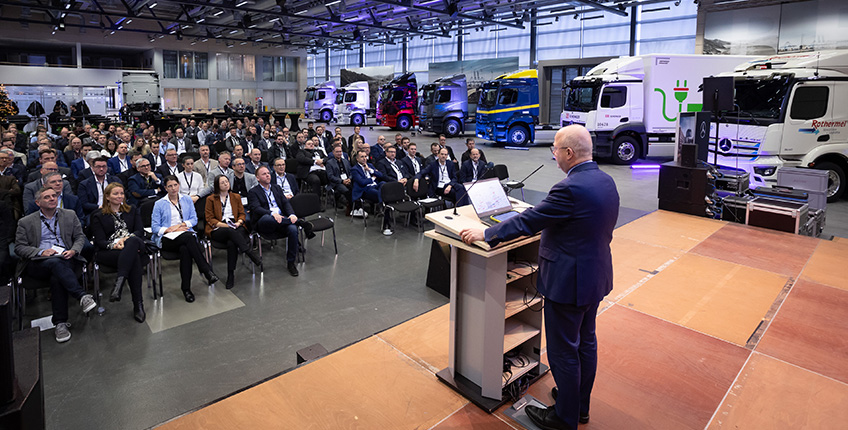The electrification of plant logistics at the Mercedes-Benz facility in Wörth, Germany, is making great strides forward. The first twelve electric trucks have now been handed over to customers.
Mercedes-Benz Trucks is driving the transformation of the transport sector towards CO2-neutral drives forward and is also investing in e-trucks in its own supply chain. In its anniversary year 2023, the Mercedes-Benz plant in Wörth is taking a decisive step towards the electrification of plant transport: numerous logistics partners are taking delivery of around 20 battery-electric eActros 300s for use in inbound logistics. The handover of the first twelve vehicles to the logistics service providers was commemorated with a ceremony at the Wörth plant on 4 December. Starting in the first quarter of 2024, these vehicles will be used to carry out around 50 all-electric transports to the Wörth plant every day.
KsNI funding for charging infrastructure and vehicles
The project to electrify Wörth’s inbound logistics is being funded by the Federal Ministry for Digital and Transport with a total of around 3 million euros as part of the directive on the promotion of light and heavy commercial vehicles with alternative, climate-friendly drive systems and the associated refuelling and charging infrastructure (KsNI – Richtlinie über die Förderung von leichten und schweren Nutzfahrzeugen mit alternativen, klimaschonenden Antrieben und dazugehöriger Tank- und Ladeinfrastruktur). The funding guideline is coordinated by NOW GmbH and applications are approved by the Federal Office of Logistics and Mobility (Bundesamt für Logistik und Mobilität).
“Electric mobility in the transport sector is already working in numerous areas of application and electric trucks can now cover the majority of delivery routes over short and medium distances,” says Karin Rådström, CEO of Mercedes-Benz Trucks. “We want to leave the smallest possible CO2 footprint across the entire value chain. This also includes the topic of inbound logistics. We are delighted that many of our logistics partners are now switching to the all-electric Mercedes-Benz eActros 300 and driving the transformation of the industry forward with us. For some of our logistics partners, this means entering the world of electric mobility. Our team is actively supporting them with a range of consulting and service offers.”
“The fact that we are now taking the first decisive steps here in Wörth demonstrates the innovative strength of the site, which is only fitting for our 60th anniversary this year,” continues Rådström. “I am delighted that we have taken this significant step forward in Wörth in the year of the plant’s 60th anniversary.”
Michael Theurer, Parliamentary State Secretary to the Federal Minister for Digital and Transport, addressed the delivery of the first vehicles: “I am delighted with the way our funding has been successfully used to help put climate-friendly commercial vehicles on the roads. Daimler Truck is sending out a clear signal with the committed implementation of emission-free delivery transport at the Wörth plant: Electric mobility can also work outstandingly well on a large scale and with heavy commercial vehicles.”
Andreas Scharff, Head of eMobility Sales and Dealer Network Development Mercedes-Benz Trucks: “With the project to electrify plant logistics at the Wörth production site, we have undertaken real pioneering work together with our colleagues. It is now all the more important for us to share this expertise with other industrial companies, thereby fuelling the transformation to sustainable logistics and making a joint contribution to effective CO2 reduction. With our ELA programme, we are therefore deliberately expanding our consulting and service portfolio towards industrial companies.”
Suitable charging infrastructure for e-trucks at the Wörth plant
An integral part of the future inbound logistics concept of Mercedes-Benz Trucks for emission-free delivery transport is the development of an in-house charging infrastructure at the Wörth site. Following the inauguration of a pilot charging station in the summer of this year, the next five charging stations will now be installed directly in various delivery areas within the plant as well as two charging stations in the truck parking area in front of the plant gate, by the end of the year.
In total, around 30 charging stations, which will also include megawatt charging stations for high-performance battery charging, will initially be installed at key points for delivery traffic in the immediate vicinity of the production facilities at the Wörth plant. The parts used in production are delivered just-in-time to the assembly line. In future, the time during which the electric truck’s cargo is unloaded will be used to recharge the vehicle’s battery. Ideally, this means that the vehicle will not have to plan any further downtime and can resume its route immediately after the parts delivery. In addition, the possibility of re-bundling and thus optimising delivery flows in the transport network in a new consolidation centre near the site is currently being investigated.
Taking a holistic consulting approach was crucial for the electrification of Wörth’s inbound logistics. From the very beginning, both logistics and charging infrastructure experts from Mercedes-Benz Trucks were in close dialogue with the logistics companies involved on topics that went far beyond pure vehicle procurement. In addition to the required charging infrastructure at the logistics hubs, the main focus here was on precisely analysing the incoming and outgoing routes for supplying the production site and planning the charging points.
Further information can be found on the Daimler Truck AG website.
Image: Daimler Truck AG


